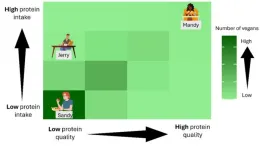(Press-News.org) The COVID-19 pandemic deepened existing health disparities and thrust children into a mental health epidemic, altering the landscape of health and wellbeing for a generation.
This is the stark warning of Dr Jatinder Hayre in his critical analysis of ‘entrenched inequities’ in the UK, The Lost Generation of COVID-19.
He presents a breadth of research to set out how, after a prolonged period of cuts to UK public services, Britain’s struggle with COVID-19 has fundamentally reshaped its social, economic, and health landscape. Dr Hayre, who led the Independent SAGE report on COVID-19 and Health Inequality, outlines urgent policy shifts to redress the balance.
The author highlights the excessive impact on children and young people from disadvantaged backgrounds, in particular: “Surging anxiety, stunted social development, and heartbreaking loneliness have coalesced into a mental health epidemic that is likely to outlast the virus itself.
“Britain stands at a pivotal moment, teetering between a path of meaningful reform and a slide into deeper inequity. COVID-19 exposed and magnified the mental health vulnerabilities of our children. If unaddressed, these psychological wounds may define a generation: permanently blocking some children from realising their potential and cementing a landscape of enduring social inequality.”
While these disparities were not created by the pandemic, Dr Hayre explains how these issues were ‘thrust into sharper relief’ by the crisis. Dr Hayre explains how, after a decade of austerity, education provision was already under-funded with the most deprived areas facing the largest proportional losses.
So, he explains, when the pandemic arrived, ‘these existing fissures became chasms’; for example, children in lower income households lacking access to technology were unable to keep up with remote learning. Meanwhile, children in well-resourced families were able to adjust to remote learning, with private tutoring, parental oversight and dedicated study spaces.
Inequities in education have profound implications, as research unequivocally shows that adults with less schooling experience disproportionately higher rates of cardiovascular disease, obesity and mental health issues.
Besides the academic impact, school closures impacted children in other ways; children living in poverty no longer had access to free hot meals, while children from at-risk or violent households no longer had adult supervision and safeguarding.
Dy Hayre said: “For those already living in poverty, the combined effect of losing out on learning, school meals, and emotional support created a crisis of compounding vulnerabilities. Post-traumatic stress, heightened anxiety, and social isolation threated to derail development at a critical juncture, with long term implications for children’s longer term mental and physical health.”
Dr Hayre suggests a ‘hidden catastrophe’ of the pandemic is ‘the mental health crisis that has engulfed our youngest citizens’. He explains that mental health services were already stretched in 2019, with demand far outstripping supply, and the pandemic exacerbated this shortfall on multiple fronts.
Children, isolated from their peer groups and family, reported heightened rates of stress, depression, and suicidal ideation. Academic setbacks for those unable to afford laptops and tutors, thrust children into despair: “the mental anguish of being left out – of both education and social life – was sharp.”
Dr Hayre explains how children’s brains are susceptible to trauma, with prolonged stress rewiring emotional regulation, increasing the risk of lifetime anxiety and depression.
“For disadvantaged children, the mental health repercussions of repeated academic failure can solidify a cycle of poverty, poor health and reduced aspirations. This is how a mental health crisis transforms into a societal crisis, with ramifications for the very fabric of post-pandemic Britain,” he explains.
To address these disparities, Dr Hayre suggests urgent policy shifts to prioritise mental health, from education reform to welfare provision, with ring-fenced funding for child mental health services. Besides the moral and social concerns of health inequity, the author points to the broader societal ramifications such as a shrinking workforce, economic stagnation and growing pressure on healthcare services.
Dr Hayre advocates for policy interventions and structural reforms anchored in equity and fairness, and warns: “If we fail to address the structural underpinnings of inequality, future crises will merely entrench them further. The question is not merely how to fix what is broken but how to imagine a society in which no group is systematically left behind.
“Failure to act decisively means condemning millions of children to carry the pandemics trauma well into adulthood, perpetuating cycles of poverty, ill health and despair.”
He argues for a system he calls ‘weighted universalism’, which amounts to universal access – with extra services weighted to the most disadvantaged areas, to front-load intervention where the need is higher.
For example, this includes free paediatric mental health services across the board, but with extra coverage in high poverty areas.
“By ensuring that every child is equipped, protected and empowered,” he explains, “we lay the cornerstone for a post pandemic Britain that not only recovers but thrives, forging a legacy of justice, progress, and unity for generations to come.”
END
Children face ‘lifelong psychological wounds’ from entrenched inequities made worse by pandemic, doctor warns
2025-04-16
ELSE PRESS RELEASES FROM THIS DATE:
New research reveals socio-economic influences on how the body regulates eating
2025-04-16
Published in the journal Food Quality and Preference, the research highlights how physiological signals, particularly those transmitted via the vagus nerve, interact with socio-economic factors to shape dietary behaviour.
The study involved 96 students from diverse socio-economic backgrounds who participated in a chocolate tasting session.
In a controlled laboratory setting, each participant was presented with a plate containing 70 milk chocolate pieces and invited to sample and rate them at their leisure.
Researchers measured each student's heart rate variability (HRV) as a proxy for ...
Unhealthy metabolic profile sharply increases risk of breast cancer returning and subsequent death from breast cancer among those who have survived the disease
2025-04-16
New research to be presented at this year’s European Congress on Obesity (ECO 2025, Malaga, Spain, 11-14 May) and published in The Journal of Internal Medicine shows that, in survivors of breast cancer, having an unhealthy metabolic profile or so called ‘metabolic syndrome’ increases the risk of breast cancer recurrence by 69%, and subsequent breast cancer mortality by 83%. The study is by Dr Sixten Harborg, Department of Oncology, Aarhus University/Aarhus University Hospital, Aarhus, ...
Marine radar can accurately monitor vessel speeds to protect whales, study finds
2025-04-16
A new study by researchers at ProtectedSeas highlights the potential of marine radar technology to monitor speed of small vessels. The research, aimed at testing the accuracy of radar in assessing potential violations, found that the technology could detect speed violations with 95% confidence, offering a promising solution to help reduce the threat of vessel strikes on whale populations. The analysis was recently published in the journal Sensors.
The impact of small vessels on whales is becoming a growing concern in busy marine environments due to the increasing number ...
National Center to Reframe Aging teams up with West End Home Foundation
2025-04-16
The National Center to Reframe Aging — the leading organization for proven communication strategies and tools to effectively frame aging issues — is partnering with The West End Home Foundation (WEHF), an independent charitable foundation located in Nashville, Tennessee.
The National Center to Reframe Aging will be a strategic partner to support the WEHF’s mission to enrich the lives of older people through grant making, advocacy, and community collaboration. Key leaders of the Tennessee Department of Disability and Aging and the Tennessee aging network will participate in educational opportunities and receive tools from the National Center ...
How do age, sex, hormones and genetics affect dementia biomarkers in the blood?
2025-04-16
EMBARGOED FOR RELEASE UNTIL 4:00 P.M. ET, WEDNESDAY, APRIL 16, 2025
MINNEAPOLIS — A new study has found important clues about the roles age, sex, hormonal changes and genetics play in how certain biomarkers for dementia are expressed in the blood, according to a study published on April 16, 2025, online in Neurology®, the medical journal of the American Academy of Neurology.
“Blood tests that detect biomarkers for Alzheimer's disease and other dementias are emerging and as these tests are further developed, they are becoming important tools for understanding and diagnosing ...
NSF NOIRLab astronomer discovers oldest known spiral galaxy in the Universe
2025-04-16
Large, grand-design spiral galaxies like our own Milky Way are common in the nearby Universe. But they have proven hard to find in the early Universe, which is consistent with expectations that large disks with spiral arms should take many billions of years to form. However, assistant astronomer Christina Williams of NSF NOIRLab, which is funded by the U.S. National Science Foundation, has discovered a surprisingly mature spiral galaxy just one billion years after the Big Bang [1]. This is the most distant, earliest known ...
Iron Age purple dye "factory" in Israel was in operation for almost 500 years, using mollusks in large-scale specialized manufacturing process
2025-04-16
Iron Age purple dye "factory" in Israel was in operation for almost 500 years, using mollusks in large-scale specialized manufacturing process
Article URL: https://plos.io/44elLDX
Article title: Tel Shiqmona during the Iron Age: A first glimpse into an ancient Mediterranean purple dye ‘factory’
Author countries: U.S., Israel
Funding: The author(s) received no specific funding for this work. END ...
Even vegans who get enough total protein may fall short for some essential amino acids
2025-04-16
In a new study of people with long-term vegan diets, most ate an adequate amount of total daily protein, but a significant proportion did not meet required levels of the amino acids lysine and leucine. Bi Xue Patricia Soh and colleagues at Massey University, New Zealand, present these findings in the open-access journal PLOS One on April 16, 2025.
Proteins are made up of various molecular “building blocks” known as amino acids. While the human body can synthesize most of the amino acids we need to live, we completely rely on the ...
RoboBee comes in for a landing
2025-04-16
The Harvard RoboBee has long shown it can fly, dive, and hover like a real insect. But what good is the miracle of flight without a safe way to land?
A storied engineering achievement by the Harvard Microrobotics Laboratory, the RoboBee is now outfitted with its most reliable landing gear to date, inspired by one of nature’s most graceful landers: the crane fly.
Publishing in Science Robotics, the team led by Robert Wood, the Harry Lewis and Marlyn McGrath Professor of Engineering and Applied Sciences in the John A. Paulson School ...
“Ban-the-Box” policy did not effectively help job applicants with criminal records in one analysis
2025-04-16
Analysis of job applicant data from one large employer suggests that a policy meant to improve employment prospects for people with criminal records did not actually lead to changes in job offers for people with records. Deborah Weiss of Northwestern University, U.S., and colleagues present these findings in the open-access journal PLOS One on April 16, 2025.
Parts of the U.S. have introduced “Ban-the-Box” (BTB) laws, which aim to improve job prospects for people with criminal records. ...





